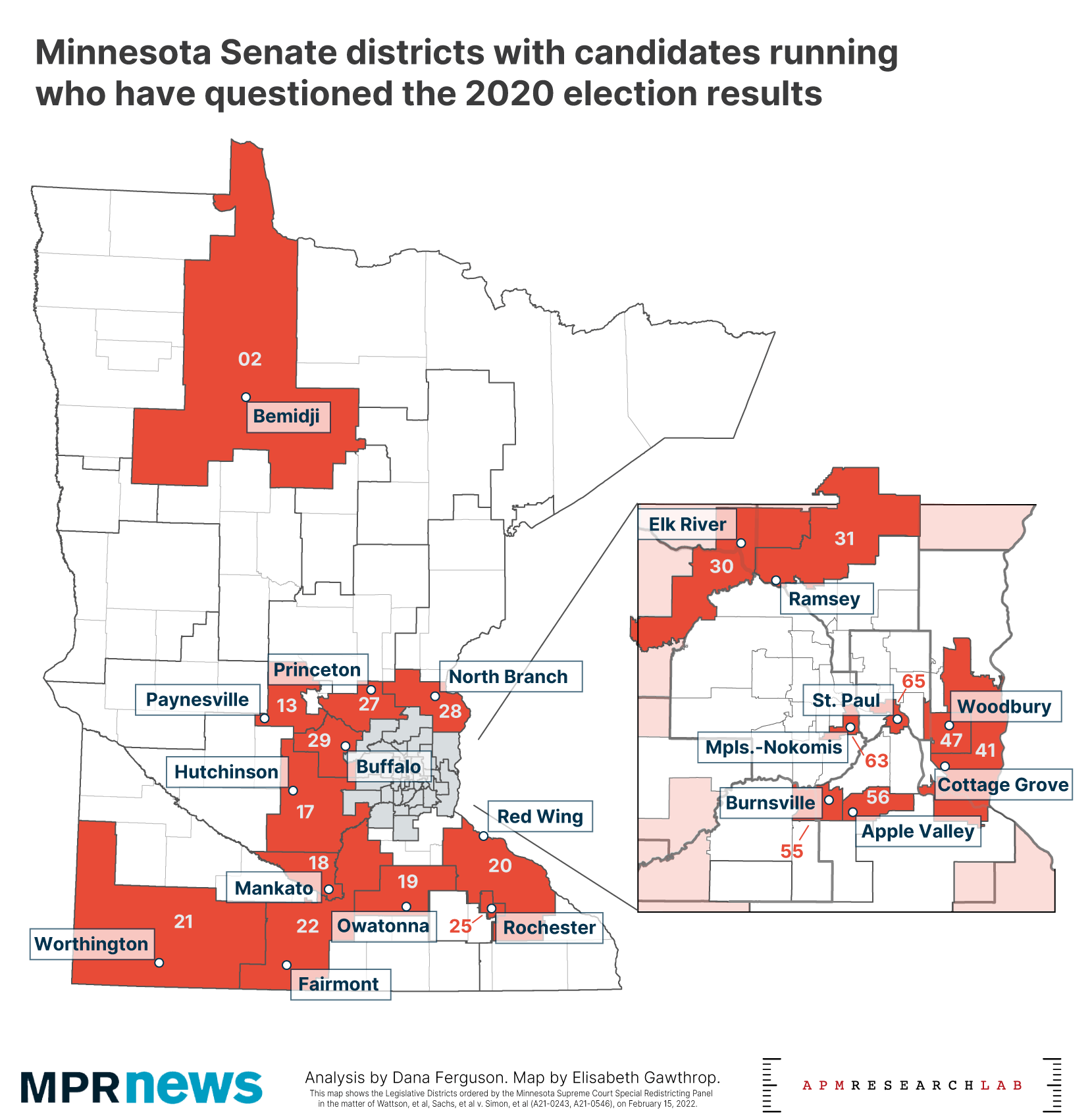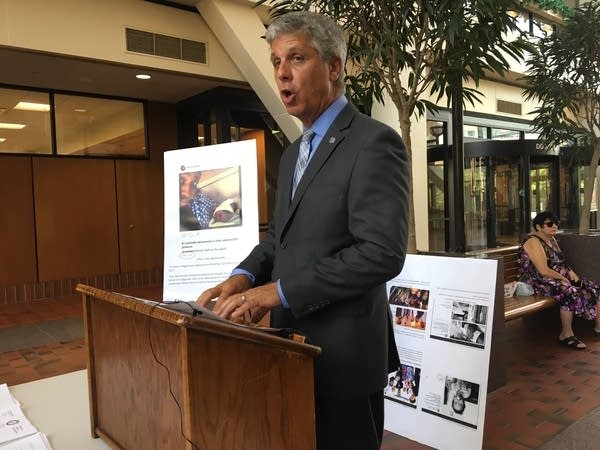Nearly 1 in 4 Minnesota GOP legislative candidates questioned 2020 election

Go Deeper.
Create an account or log in to save stories.
Like this?
Thanks for liking this story! We have added it to a list of your favorite stories.
Nearly one in four Republicans running for the Minnesota Legislature this year have rejected or questioned the outcome of the 2020 election, according to an MPR News analysis.
The GOP candidates could determine which party controls the Minnesota House and Senate next year, and they could have a strong role in crafting election law in Minnesota.
MPR News combed through candidates’ public comments and actions, social media posts, campaign websites and legislative track records to determine how many questioned the integrity of the 2020 election in Minnesota and elsewhere, despite evidence the election was sound and allegations of extensive fraud were unfounded.

The review found out of 183 Republicans currently running for the Legislature, 43 — 20 running for Senate and 23 running for the House — have rejected or questioned President Joe Biden’s victory in 2020. Among them:
Turn Up Your Support
MPR News helps you turn down the noise and build shared understanding. Turn up your support for this public resource and keep trusted journalism accessible to all.
Three candidates who lost their races in 2020 — Pam Myhra, Fern Smith and Cynthia Lonnquist — signed onto a lawsuit challenging the results of the 2020 election in Minnesota, alleging “glitches” with voting machines.
Besides questioning Biden’s victory, Myhra, Smith and Lonnquist also contended without proof that their own 2020 losses were illegitimate. Myhra, months after the election, told a local candidate forum, “The final count didn’t go my way, but I’m saying I won.”
Five candidates — Reps. Glenn Gruenhagen, Steve Drazkowski, Eric Lucero, Mary Franson and Susan Akland — rallied at the Minnesota Capitol, as part of a “Stop the Steal” demonstration on Jan. 6, 2021.
Seven — Sen. Jeff Howe, Reps. Gruenhagen, Drazkowski, Greg Boe, Shane Mekeland and Erik Mortensen, as well as Tom Dippel — called for an audit of the 2020 election.
Thirteen sitting lawmakers signed onto a lawsuit asking the Texas attorney general to sue Minnesota, alleging the state’s election was conducted illegally.
Two dozen posted on social media or on campaign websites rejecting the result of the election. For example, nine said without evidence that Biden cheated; one claimed ballots were improperly harvested; five posted about alleged voter fraud in the election and six others said the election was illegitimate.
 Activities from some Minnesota Senate candidates include questioning the legitimacy of the 2020 election and signing a letter asking the Texas Attorney General to sue Minnesota over the election.Elisabeth Gawthrop | APM Research Lab
Activities from some Minnesota Senate candidates include questioning the legitimacy of the 2020 election and signing a letter asking the Texas Attorney General to sue Minnesota over the election.Elisabeth Gawthrop | APM Research Lab
The candidates are running in districts around the state, although most are in greater Minnesota communities that favored President Donald Trump in 2020.

Nine of the candidates are running in competitive legislative races, while two are unopposed. Another 23 are in districts that Republicans are favored to win.
Because all the state legislative districts were redrawn for the 2022 election, it’s difficult to compare the number of election denying candidates who will take over seats of lawmakers who’d accepted the results of the election.

Larry Jacobs, director of the Center for the Study of Politics and Governance at the University of Minnesota, called it “alarming” that so many Minnesota Republican candidates this cycle denied the legitimacy of the 2020 election.
“It undermines confidence in our electoral process, questions the legitimacy of our democracy. It's a serious situation,” he said.
‘I’m saying I won’
Democrats have sought to campaign on the issue of keeping democracy safe after the Jan. 6 insurrections. But the issue hasn’t risen to the level of other concerns such as inflation, crime and abortion access heading into Election Day, according to recent polls of Minnesota voters.
Pro-Trump candidates around the country have cast doubt on the 2020 election and have wavered in their willingness to accept the results, raising concerns about candidates who could refuse to concede if they lose this year or attempt to overturn the result.
At least a handful rejected the outcome of their legislative races in Minnesota in 2020.
Pam Myhra, Fern Smith and Cynthia Lonnquist signed onto a lawsuit challenging the 2020 election results, citing unexplained “glitches” in Dominion voting machines. A district court judge dismissed the challenges with prejudice, meaning the case can’t be refiled.
Eight months after the election, Myrha at a Senate District 56 event said she hadn’t lost.
"You’re not going to read this anywhere else, but I won,” she said. “And the reason I can say that is the reason I'm not in the Legislature, the final vote count didn't go my way, but I'm saying I won."
Myhra didn’t respond to requests for comment.
Other Republican candidates have said they expect to accept the result of their contests, but some questioned whether contests in other parts of the state will be handled legally.
“I've never seen any election problems in my district in the years that I've run,” said state Rep. Steve Drazkowski, R-Mazeppa, who is running for the state Senate. “And I don't expect it.”
Drazkowski was one of a handful of state lawmakers to participate in a “Stop the Steal” rally at the Minnesota Capitol and to vote against a resolution condemning those who led the Jan. 6 insurrection in the U.S. Capitol.

Minnesota GOP Chair David Hann said he expects Republican candidates will accept the result of the 2022 elections, barring races that are too close to call right away.
“I think all our candidates have made it clear that they're going to accept the results of the election,” Hann told MPR News. “That doesn't mean that elections are without problems. The question of whether or not those issues rise to a level that may require recounts — that all has to be determined.”
While candidates for statewide and congressional races have been asked about their stance on the legitimacy of the last election, legislative hopefuls mostly have not been asked. But if they win next week, the legislative candidates could help write laws affecting Minnesotans’ ability to vote.
The Minnesota Republican Party platform calls for voting law rewrites, including shortening the state’s early voting window, limiting those who can vote early to members of the military and those with sufficient cause, and eliminating drop boxes where absentee ballots are collected.
Earlier this year, the GOP-led Senate passed legislation that would have required Minnesotans to show a photo ID to cast a ballot and set up a provisional ballot system for those who didn’t have an ID. The DFL-controlled House did not pass a similar bill.
Minnesota voters rejected a proposed constitutional amendment in 2012 that would have required a photo ID to vote.
Democrats have argued voter ID and other changes could keep low-income people and people of color from voting. They’ve campaigned on making it easier for Minnesotans to cast a legal ballot.
“I think it's anathema to our values as Minnesotans, regardless of party,” said Minnesota DFL Party Chair Ken Martin. “If Republicans win down the ballot, both the House and the Senate will have a dangerous new class of election deniers in the Legislature now with power to pass laws that disrupt our elections and could potentially damage our democracy. I mean, the stakes are high here.”
Vowing to restore trust while sowing doubt
Some candidates have moved away from early denial about the election. But for others, the message has been central to their campaign. And they’ve been open about their desire to rein in voting access.
Walter Hudson is running for a state House seat representing St. Michael, Albertville, Hanover, part of Otsego and Rockford Township, and on his campaign website alleges that the Minnesota secretary of state’s office loosened restrictions on absentee voting in 2020 in such a way that allowed for questionable outcomes.
Changes were in place in 2020. Minnesota entered into agreements with groups that sued over ballot access during the pandemic, and those changes were approved and upheld by state courts. Election reviews and lawsuits have failed to turn up evidence of widespread fraud that would have affected the outcome of the election.
“It’s time to confront the fact once and for all that our election system is fundamentally broken and deeply corrupt,” Hudson says in a video on his campaign website, despite the lack of evidence of fraud. “We need to transform the way our election system works in order to restore integrity and accountability in the process.”
Mark Bishofsky, a Republican running for a House seat in the Stillwater area, raised doubts in a campaign video on YouTube about the record number of absentee ballots cast in the 2020 election. And he urged supporters to press county election officials to get rid of voting machines and hand count ballots.
“Create a rally atmosphere, go get a bunch of people that are willing to speak and have support there and basically demand that they get rid of these voting machines,” he said.
Election administrators counter that machine counts are generally more accurate than hand counts, and that testing has repeatedly proved that.
Other candidates have moved away from their comments about the last election in the months since and said that President Joe Biden won, even if they’re not happy about it.
The candidates who are still disputing the last election could also play a key role if the U.S. Supreme Court grants state legislatures independent authority to set election rules that break with state constitutions, without the ability for state courts to step in. The high court is considering a case from North Carolina that could consolidate state lawmakers' power over elections.
Election skeptics have grown in number across the country in the Republican Party and hundreds are expected to be elected to state and federal offices this fall, according to recent analyses.
“The problem, and it is a problem with election deniers not only in Minnesota but throughout the country, is for Republicans to say, 'This is not who we are,’” said Cindy Rugeley, a political science professor at the University of Minnesota Duluth. “They’re going to have to confront that.”




